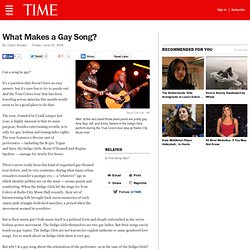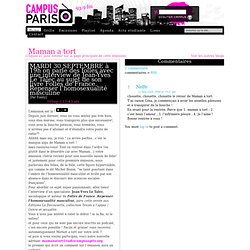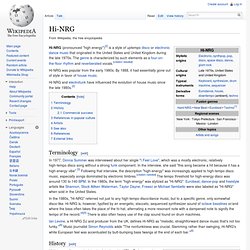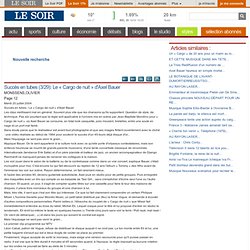

Prince - Sign ‘O’ The Times. Bleu Blanc Rose 5 - Les années Noires 1/3. Bleu Blanc Rose 6 - Les années Noires 2/3. Bleu Blanc Rose 7 - Les années Noires 3/3. Arts >> Music and AIDS. A number of musical works in various genres have responded directly or indirectly to the AIDS crisis. Many musical works that refer to AIDS are about emotions, thus focusing on expressions of grief, anger, or sympathy, rather than on the personal and social consequences of the disease (as in novels, film, or drama) or on political confrontation (as in many works of visual art). As a result, music about AIDS sometimes seems less specific than work in other media. Nevertheless, music of all kinds has registered the enormous impact of AIDS. The earliest works appeared around the same time as the first AIDS plays, including punk songs by Karl Brown and Matthew McQueen for San Francisco's collaborative The AIDS Show ("Safe Livin' in Dangerous Times" and "Rimmin' at the Baths," September 1984).
Much music about AIDS was written for fundraising purposes. Most of these are written as though by a survivor remembering a friend or by an "outsider" developing sympathy for PWAs. Musique et sida. Playlist - Indigo Girls - Closer to Fine. What Makes a Gay Song? Can a song be gay?

It's a question that doesn't have an easy answer, but it's sure fun to try to puzzle out. And the True Colors tour that has been traveling across America this month would seem to be a good place to do that. The tour, founded by Cyndi Lauper last year, is highly unusual in that its main purpose, besides entertaining crowds, is to rally for gay, lesbian and transgender rights. The tour features a diverse cast of performers — including the B-52s, Tegan and Sara, the Indigo Girls, Rosie O'Donnell and Regina Spektor — onstage for nearly five hours.
There's never really been this kind of organized gay-themed tour before, and its very existence, during what many urban crusaders consider a postgay era — a "whatever" age in which identity politics are on the wane — seems quaint and comforting. But is their music gay? But why? J.D. Like all the great gay arguments, such as whether Ernie and Bert are more than just friends, getting there is half the fun.
True Colors Fund. Video : Interview with lesbian icons the Indigo Girls. The Smiths - This Charming Man. This Charming Man. "This Charming Man" is a song by the English alternative rock band The Smiths, written by guitarist Johnny Marr and singer/lyricist Morrissey. It was released as the group's second single in October 1983 on the independent record label Rough Trade. The song is defined by Marr's jangle pop guitar riff and Morrissey's characteristically morose lyrics, which revolve around the recurrent Smiths themes of sexual ambiguity and lust.[1] Feeling detached from and unable to relate to the early 1980s mainstream gay culture, Morrissey wrote "This Charming Man" to evoke an older, more coded and self-aware underground scene.
The singer explained of the song's lyrics, "I really like the idea of the male voice being quite vulnerable, of it being taken and slightly manipulated, rather than there being always this heavy machismo thing that just bores everybody. Background[edit] Music and lyrics[edit] I'll try any trick. Reception[edit] Versions and release history[edit] Paroles et traduction The Smiths : This Charming Man. Histpdrock02. Dead or alive - You spin me round. MARDI 30 SEPTEMBRE à 19h on parle des folles avec une interview de Jean-Yves Le Talec au sujet de son livre Folles de France. Repenser l’homosexualité masculine at Site d’archives de Radio Campus Paris.
[Par Emily]16Sep // 11:43 am L’émission est là !

Depuis juin dernier, vous ne vous sentez pas très bien, vous êtes morose, vous transpirez plus que nécessaire! , vous avez la bouche pateuse, vous tremblez, vous n’arrêtez pas d’allumer et d’éteindre votre poste de radio?? Ahhhh mais oui, je vois ! Ça arrive parfois…c’est le manque aïgu de Maman a tort ! You spin me round (Like a record) (par Dead or Alive. Stock Aitken Waterman. Hi-NRG. Hi-NRG was popular from the early 1980s.

By 1988, it had essentially gone out of style in favor of house music. Hi-NRG and electrofunk have influenced the evolution of house music since the late 1980s.[2] Terminology[edit] In the 1980s, "Hi-NRG" referred not just to any high-tempo disco/dance music, but to a specific genre, only somewhat disco-like. Hi-NRG is, however, typified by an energetic, staccato, sequenced synthesizer sound of octave basslines or/and where the bass often takes the place of the hi-hat, alternating a more resonant note with a dampened note to signify the tempo of the record.[4][5] There is also often heavy use of the clap sound found on drum machines. Meatspin. Meatspin is a member of the power 5 shock images . It is a repetitive clip which is set to the song "You Spin Me Right Round" by Dead or Alive. Axel Bauer - Cargo de nuit. The pink and the black: homosexuals in France since 1968 - Frédéric Martel.
Cargo de nuit. Succès en tubes (3/29): Le « Cargo de nuit » d'Axel Bauer. Succès en tubes (3/29): Le « Cargo de nuit » d'Axel Bauer Page 12 Mardi 20 juillet 2004 Succès en tubes : Le « Cargo de nuit » d'Axel Bauer Les clips vieillissent mal en général.

Souvent plus vite que les chansons qu'ils supportent. Axel Bauer: «Un coup j’étais gay, un coup j’étais hétéro» Pour la promotion de son autobiographie Maintenant, tu es seul… , le chanteur Axel Bauer était l’invité de la matinale d’Europe 1 vendredi 27 janvier.

Interrogé par l’animateur Nikos Aliagas, il raconte qu’à l’époque de Cargo de Nuit , il s’amusait à jouer un double-jeu. «Vous étiez une icône… et presque une icône gay», rappelle Nikos Aliagas, à partir de 2'25. Axel Bauer explique alors avoir entretenu l’ambigüité sur son orientation sexuelle parce que l’époque s’y prêtait. Un effet de mode selon lui, mais aussi un engagement personnel : « Dans les années 80, la cause gay, c’est quelque chose qu’il faut défendre ». Les Chansons d’amour #14 : transports amoureux.